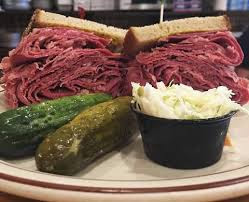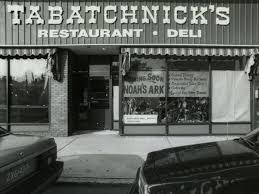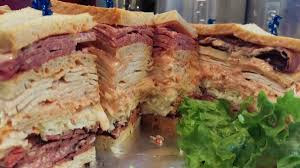|
“Remembrance of things past” is as good a title as any for this very narrow look back at growing up in Paterson. And a classic Proustian “thing” – the smells associated with the Jewish delis that populated our neighborhoods – has a special place in my memory bank. Was it just the smell that tickled my olfactory nerves? Or was it the fact that I was always brought into that odoriferous environment by my father, whom I adored. But the memory of walking into Mandiberg’s deli on Graham Avenue is as clear to me as the last time I went shopping, which was just a week ago; that’s how strong that sense is. The long counter on the right of that narrow shop; old man Mandi (as he was affectionately known) perched near the doorway; round-faced Cappy sitting and adding up the charges with a pencil on the flattened brown paper bag the goodies would be packed in. And the smell: oh, that smell! A combination of corned beef, grilling franks, stuffed derma, pickles, and whoever just walked by made for an unforgettable olfactory experience. And even though we are now almost complete vegetarians, once or twice a year I succumb to the lure of a good corned beef sandwich.
To tell the truth, I can only recall a handful of them: Mandiberg’s on Graham Avenue; Irv Friedman’s on 10th Avenue (and East 26th Street?); and Sunshine’s at the corner of Park Avenue and East 33rd Street. But the desire for corned beef and belly lox was so great that Mandi opened a second store just half a block away from Sunshine’s, just a few doors down from Mort Jacob’s drug store. (Ah, Mort Jacob’s: I remember it best for their root beer sodas, served – on tap – in thick glass mugs that were stored – until filled – in a freezer. When retrieved and filled with soda, it literally smoked with icy steam. What a theatrical presentation!)
So where have they gone, those great Jewish delis of yesteryear? Mostly they now only reside in the same corner of my brain where I store my memory of those formerly fulsome odors, now only occasionally awakened when I walk into true holdouts like Cantor’s in Los Angeles, or Max & Benny’s in Northbrook, Illinois. The rest were all victims of three irresistible forces: (1) assimilation; (2) the wandering Jew effect; and (3) our changing taste buds (a/k/a our focus on health).
I don’t have to tell you anything about these forces; they are embedded in our DNA. They are what identify us. The first – assimilation – may be the strongest: when the stigma of always being viewed – and treated – primarily as “a Jew!” no longer weighed us down 24/7, many of us (the third generation) did what so many other ethnic groups did: we tossed our parents’ milchig and fleishig plates and our Rokeach kosher soap and jumped out into the melting pot.
We also know – and likely experienced – the wandering Jew effect: Since Bar Kochba and his gang were run out of Jerusalem in 132 CE, Jews have been booted out of, forced to flee, or simply eradicated from virtually every place they put down roots: England, Spain and Portugal; the Pale of Settlement; Nazi Europe; the Middle East. (This is not intended to be a history lesson.) So naming the spiderwort houseplant the “wandering Jew” makes some sense, given how it tends to move around so quickly. Contrast this (wanderlust?) to Italians (perhaps the best city dwellers of all), who put down roots . . . and remain in place.
But whether it was restlessness, ambition, or the desire not to be tied down to old-world traditions our parents dutifully continued to follow (often because zayda lived nearby), we in the third generation quickly headed for the hills when given the opportunity. That combination of the second generation beginning to die off and the third generation already heading out the door quickly destroyed the neighborhood Jewish deli’s customer base. The recent emphasis on healthy eating only hastened the transition. Mostly, we are left only with our memories, those wonderful memories!
Yes, there are still Jewish delis around ... but fewer and fewer. In just the past dozen years or so, South Orange and Maplewood (both with large Jewish populations) have seen the closing of both Zayda’s and Seymour Tabatchnick’s famous Smoke House. (A little earlier, Ira Tabatchnick lost his last place when he accepted an offer to move his own deli into the short-lived Max’s Café & Market Place, a food emporium built on the skeletal remains of Livingston’s famous Don’s Restaurant ... only to see the entire operation quickly implode.) And New York City has seen the closing of both the Stage Delicatessen and its neighbor down 7th Avenue, the Carnegie! Now, one can only hope that Katz’ (on E. Houston Street in Manhattan) doesn’t succumb to the increasingly loud siren calls to sell their 2-story building to a high-rise developer! (Maybe they could wrangle a long-term ground floor rent-free lease as part of a deal? It’s happened before.)
So now instead we have – or HAD, until closed due to the current pandemic – what might be called regional Jewish deli-style restaurants: Irving’s on Route 10 in East Hanover; Eppes Essen in Livingston; places that draw from a multitude of neighboring communities ... but are certainly not neighborly. And while I mourn the absence of these stores, I do it knowing that I am one of the folks who closed them up because I no longer support them. And wouldn’t if given the chance again. I will have my semi-annual corned beef sandwich (providing I can find one); just like I will have a steak maybe once a year, if that. But a constant diet of that sort of food – with what we now know about nutrition – is just plain nuts. So if you really like that stuff, maybe – once they re-open – you should quickly head over to one of those remaining Jewish deli-like restaurants because they are already on the endangered species list. Ten years ago, foodie David Sax warned (in his book, “Save the Deli”) that, “Across North America, and in select cities of the Diaspora, Jewish delicatessens are disappearing faster than chicken fingers at a bar mitzvah buffet.” The intervening decade has not been any less cruel.
My wife accuses me of being sentimental. (Who, me?) Yes, I suppose I am. I am holding onto my memories of a pretty pleasant experience growing up. And one of those memories is the smell that greeted me every time I entered one of those Jewish delis. So when I walked into Eppes Essen with my whole family the last time I was back East, a tidal wave of memories – activated by that smell – flooded back to me. And for a moment, I sort of felt sorry that my three children could not share the immense joy I got from the experience. On the other hand, their arteries are probably a lot healthier for it.
Jules Zalon, JHSNJ member
|







